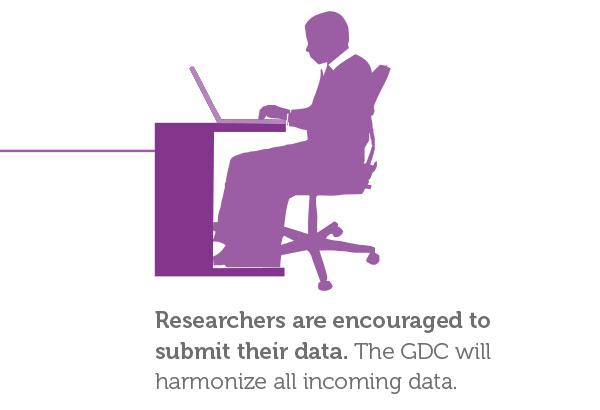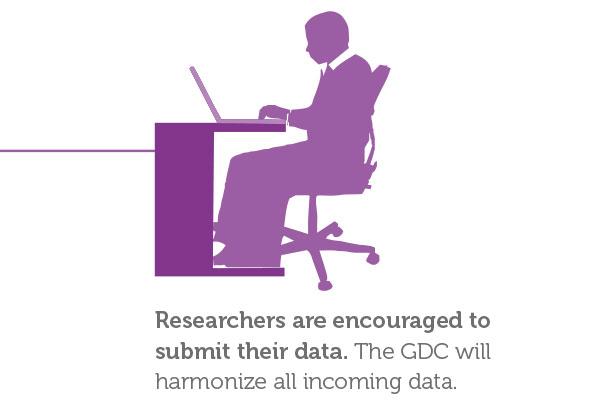
The recently launched Genomic Data Commons (GDC) will get a dramatic increase in the power and utility of its resources with the announcement today of the signing of a data sharing agreement between the National Cancer Institute (NCI) and Foundation Medicine, Inc. (FMI), a molecular information company that has generated genomic profiles of people with cancer. NCI's GDC is a unified data system that promotes the sharing of genomic and clinical data among researchers and is a core component of the Cancer Moonshot and the President's Precision Medicine Initiative. NCI is part of the National Institutes of Health.
The expanded number of cancer cases in the GDC will allow researchers to identify genomic changes that are responsible for the cancerous growth of tumors in individual patients, and identify which drugs may block the effects of these mutations. Such targeted drugs can produce remissions in certain patients.
When the GDC was launched earlier this month, it was able to immediately capitalize on the genomic data that existed in several large-scale NCI programs, such as The Cancer Genome Atlas (TCGA) and its pediatric equivalent, Therapeutically Applicable Research to Generate Effective Treatments (TARGET). Together, TCGA and TARGET represent some of the largest and most comprehensive cancer genomic datasets in the world, with information generated from about 14,500 patients.
The addition of data from 18,000 adult patients with a diverse array of cancers that underwent genomic profiling using FMI's proprietary comprehensive genomic profiling assay, called FoundationOne (trademark registered), will provide a major boost to the GDC. FMI developed FoundationOne as a commercially available test that uses advanced sequencing technology to routinely analyze cancer specimens.
"This major infusion of data in the GDC will greatly enhance our ability to use this tool to explore genetic abnormalities in cancer," said Douglas Lowy, M.D., NCI Acting Director. "Through TCGA and TARGET, we had already established a strong cancer genomic foundation for the GDC at its launch, but with the addition of the genomic data from FMI, we believe that the GDC will be an even more useful resource for researchers worldwide to help us unravel the complexities of many forms of cancer."
Importantly, in both the NCI and the Foundation Medicine databases, all patient information has been de-identified, meaning that personal information, such as addresses, Social Security numbers, and other possible identifiers, are not present — only crucial genetic data and key demographic information are available.
"We're honored to participate in this important global effort to transform patient care and to be the first commercial entity to contribute data to the NCI's GDC, which we believe underscores the quality, integrity and richness of the genomics information contained in Foundation Medicine databases," said Vincent Miller, M.D., chief medical officer, Foundation Medicine. "The amount of genomics information within Foundation Medicine databases has reached unparalleled scale. The insights gleaned from this data release will be instrumental in accelerating research and development efforts for targeted agents and immunotherapies."
The genomics information contributed by Foundation Medicine can be used by authorized researchers following approval by an NIH Data Access Committee. Requesters must affirm that their use of the data is solely for biomedical research purposes and for publication or presentation in scientific journals or at research meetings.
###
The National Cancer Institute leads the National Cancer Program and the NIH's efforts to dramatically reduce the prevalence of cancer and improve the lives of cancer patients and their families, through research into prevention and cancer biology, the development of new interventions, and the training and mentoring of new researchers. For more information about cancer, please visit the NCI website at http://www.cancer.gov or call NCI's Cancer Information Service at 1-800-4-CANCER.
About the National Institutes of Health (NIH): NIH, the nation's medical research agency, includes 27 Institutes and Centers and is a component of the U.S. Department of Health and Human Services. NIH is the primary federal agency conducting and supporting basic, clinical, and translational medical research, and is investigating the causes, treatments, and cures for both common and rare diseases. For more information about NIH and its programs, visit http://www.nih.gov.
Media Contact
NCI Press Officers
[email protected]
301-496-6641
http://www.cancer.gov





